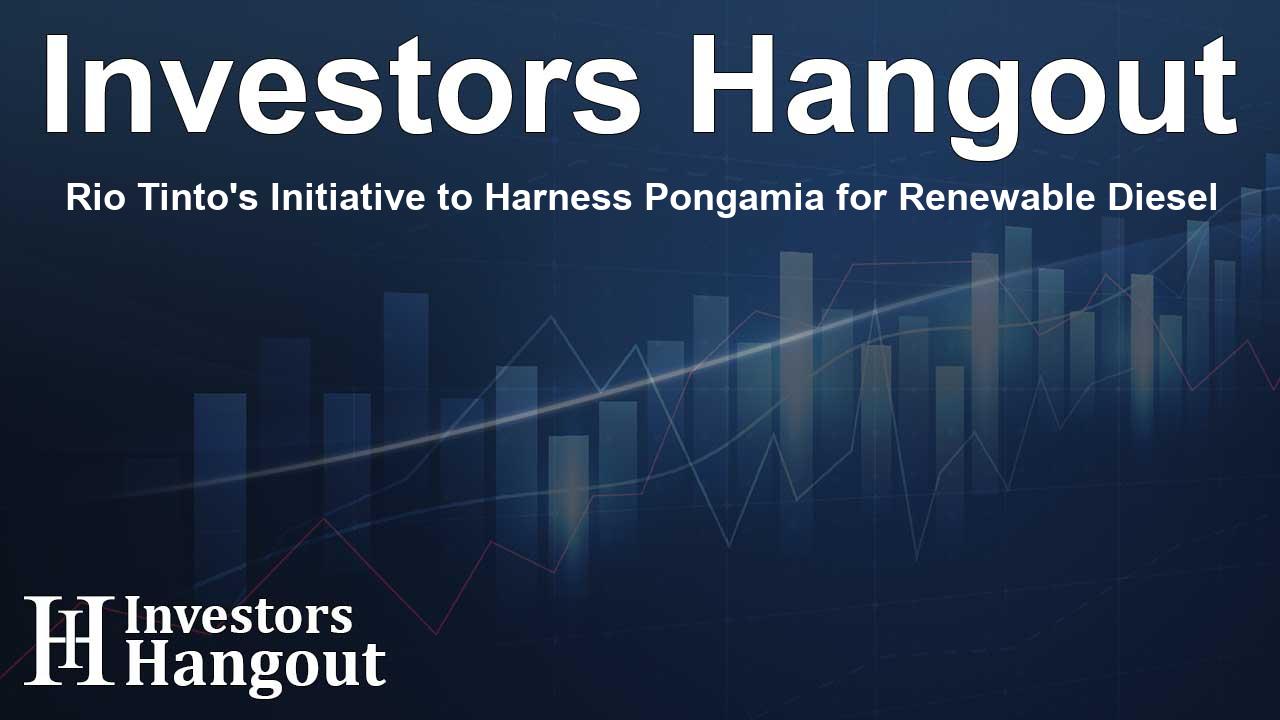Rio Tinto's Initiative to Harness Pongamia for Renewable Diesel

Rio Tinto's Commitment to Sustainable Energy Solutions
Rio Tinto is taking significant steps towards sustainability by investing in Pongamia seed farms aimed at exploring their potential for renewable diesel production. With a keen eye on reducing reliance on fossil fuels, which contribute to a notable percentage of emissions, this initiative underscores RIO's commitment to net-zero goals.
In its pursuit of achieving net-zero Scope 1 and 2 carbon emissions by 2050, Rio Tinto recognizes electrification as a long-term solution for replacing diesel in its operations. However, addressing emissions immediately is crucial, and biofuels present an expedient alternative while the transition to full electrification is still underway.
The Importance of Biofuels in Australia's Future
Currently, Australia lacks a robust biofuel feedstock industry to meet its growing domestic demand. This gap presents a unique opportunity for projects like Rio Tinto's to play a pivotal role in establishing a sustainable biofuel sector. This pilot program is crucial to bridging the shortfall while simultaneously advancing RIO's decarbonization strategy.
Joining Forces for Pongamia Plantations
Pongamia, a fast-grower native to Australia, is a key part of this eco-friendly venture. The seeds of this tree are oil and protein-rich, suitable for converting into renewable diesel. This process not only offers a cleaner fuel but also provides a solution for the seed byproduct – the meal and pod – which can be turned into livestock feed. Additionally, its drought resistance and low maintenance needs make it an ideal candidate for cultivation.
To ensure the success of this initiative, Rio Tinto is securing approximately 3,000 hectares of land in north Queensland for research and development. They plan to cultivate around 750,000 Pongamia saplings in collaboration with Midway Limited, who will manage these seed farms.
Pioneering Emission Reduction Efforts
Rio Tinto's efforts extend beyond biofuels as demonstrated by its recent achievements in emission reductions. In 2023, the company reported Scope 1 and 2 emissions of 32.6 Mt CO2e, which reflects a 5.5% decrease from its 2018 figures. RIO has committed to invest between $5 billion to $6 billion by 2030 to advance its decarbonization strategy.
Further enhancing its green credentials, in mid-2024 RIO plans to introduce carbon-free aluminum smelting cells at its Arvida smelter in Québec. This groundbreaking ELYSIS technology effectively eliminates direct greenhouse gas emissions from the aluminum production process, thereby yielding significant environmental benefits.
Collaborative Trials for Electric Haul Trucks
In a notable partnership with BHP Group, Rio Tinto intends to trial battery-powered haul trucks to further slash diesel emissions in mining operations. These trials will deploy two types of trucks in a phased approach, with both companies aiming to address the growing need for sustainable haulage solutions in the mining industry.
While charging infrastructure and battery technologies are evolving, industry experts believe mass deployment of electric trucks may not be feasible until after 2030. In light of this, Rio Tinto is proactively searching for alternative solutions, such as the exploration of biofuels, to ease the transition and reduce its carbon footprint across operations.
Evaluating Performance in a Changing Market
Amid these shifts towards sustainable practices, Rio Tinto's stock performance remains noteworthy. Over the past year, the company has experienced a modest rise in shares, showcasing resilience against broader industry trends. This positive trajectory reflects growing investor confidence in RIO's sustainability commitments and business strategies.
With these initiatives, Rio Tinto stands at the forefront of the transition towards renewable energy, leveraging innovative approaches such as the usage of Pongamia for renewable diesel production. As RIO seeks to minimize its environmental impact, partnerships and strategic investments in sustainable practices will be key drivers of success in the future.
Frequently Asked Questions
What is Rio Tinto's latest initiative concerning biofuels?
Rio Tinto is investing in Pongamia seed farms in Australia to explore their potential as a renewable diesel feedstock.
Why is biofuel feedstock significant for Australia?
Australia currently lacks a biofuel feedstock industry to meet domestic demand, making initiatives like RIO's essential for sustainable energy solutions.
What are Pongamia trees known for?
Pongamia trees grow quickly, yield oil-rich seeds suitable for renewable diesel production, and require minimal resources, making them easy to cultivate.
How does Rio Tinto plan to achieve net-zero emissions?
Rio Tinto aims for net-zero Scope 1 and 2 emissions by 2050, utilizing electrification, biofuels, and substantial capital investments as strategies.
What is the partnership with BHP Group about?
Rio Tinto has partnered with BHP Group to trial battery-powered haul trucks, targeting zero-emissions in mining operations.
About Investors Hangout
Investors Hangout is a leading online stock forum for financial discussion and learning, offering a wide range of free tools and resources. It draws in traders of all levels, who exchange market knowledge, investigate trading tactics, and keep an eye on industry developments in real time. Featuring financial articles, stock message boards, quotes, charts, company profiles, and live news updates. Through cooperative learning and a wealth of informational resources, it helps users from novices creating their first portfolios to experts honing their techniques. Join Investors Hangout today: https://investorshangout.com/
Disclaimer: The content of this article is solely for general informational purposes only; it does not represent legal, financial, or investment advice. Investors Hangout does not offer financial advice; the author is not a licensed financial advisor. Consult a qualified advisor before making any financial or investment decisions based on this article. The author's interpretation of publicly available data shapes the opinions presented here; as a result, they should not be taken as advice to purchase, sell, or hold any securities mentioned or any other investments. The author does not guarantee the accuracy, completeness, or timeliness of any material, providing it "as is." Information and market conditions may change; past performance is not indicative of future outcomes. If any of the material offered here is inaccurate, please contact us for corrections.